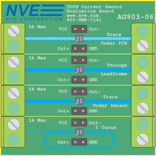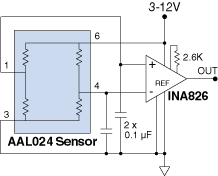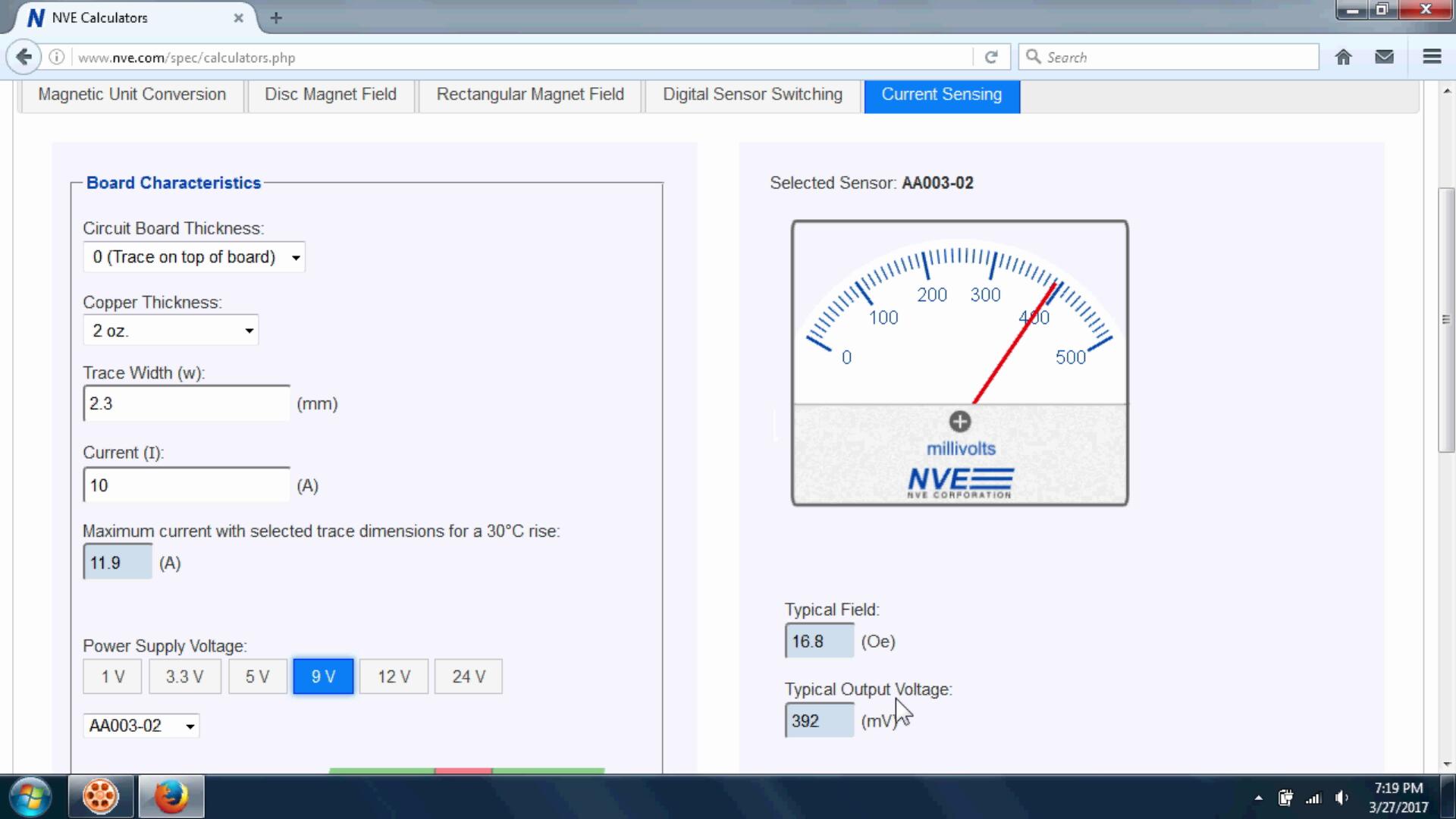|
NVE is operating
normally during Super Bowl week, and open on President’s
Day, Monday, February 19. |
|
|
|
|
|
 |
 |
AAL024
TDFN
Current-Over-Trace Sensor |
|
|
|
The new AAL024-10E combines small
size, high sensitivity, and cross-axis sensitivity for an ideal current-over-trace
sensor.
Key AAL024 features include:
• Wheatstone bridge
analog output
• 3.6 mV/V/Oe typ. magnetic sensitivity
• 1.5 – 10.5 Oe linear range
• Up to 300 mV/A typ. current sensitivity (5V supply)
• Omnipolar for AC or DC measurements
• <4% nonlinearity
• <2% hysteresis
• 2.2 kΩ typ. bridge resistance
• Operation to near-zero voltage
• Ultraminiature 2.5 mm x 2.5 mm x 0.8 mm
TDFN6
Download datasheet >

Evaluation
Kit
 The
AAL024
Evaluation Board includes four AAL024 sensors in four different circuit
board configurations. The
AAL024
Evaluation Board includes four AAL024 sensors in four different circuit
board configurations.
Board specifications include:
• 2" x 2" (50 mm x 50 mm) PCB
with four different
current-trace configurations
• Screw terminals for
14 to 30 AWG wires
• Current sensitivity to 60 mV/V/A typ. (300 mV/A
with a 5V supply)
• Up to 5 amp AC or DC noncontact current measurement

Reference
Circuit:
Simple Bridge Sensor Amplifier
GMR sensors have high output signals without amplification, but if single-ended
signals higher amplitude are needed, instrumentation amplifiers can minimize parts
count:

AAL024 with an instrumentation amplifier.
The INA826 is an inexpensive instrumentation amplifier. The gain is limited to
20 to avoid saturating the amplifier.
The high-frequency cutoff frequency in this example is 1.5 kHz, set by the
0.1 µF capacitors and the 1.1 KΩ bridge output resistance
(half the bridge resistance).
Since the instrumentation amplifier has a minimum output of 0.1 volts, to
detect very low fields on a single supply, an offset can be provided by using
a non-zero amplifier reference voltage. The reference voltage can also be used
to trim out sensor offset voltage.
|
 |
|
Upcoming
Conferences |
|
|

Distributor Hy-Line
Power will display NVE products at Embedded World, February 27
to March 1, at Halle 1/Stand 170, Messe Nürnberg, Germany.
Featured new products will include the IL3685-1E
40 Mbps Ultrahigh Speed QSOP Transceiver and IL2985E
Low-Power Transceiver.
|
 |
|
Applications
Corner |
|
|
Current
Sensing with an AAL024 Sensor
The new AAL024
analog magnetic sensor is designed for sensing current through a circuit-board
trace. This type of current sensing is accurate, virtually lossless, provides
inherent electrical isolation, and can be used for AC or DC.
This video
demonstrates:
|
 |
|
Web
App |
|
|
NVE’s current sensing Web
application lets you simulate AAL024 sensor output with different current-carrying
traces at various distances.
The handy app accommodates a variety of current-carrying traces and does the complex
math for you:

|
 |
|
Happy
e-Day! |
|
|
Like many people, on February
7—e-Day—we’ll be reflecting on the importance of Euler’s constant
(2.718).
For example, here’s a formula for an iterative true RMS current calculation
with an exponential time-domain response:
Where:
an
is the sampled instantaneous current;
n
is the sample or iteration number;
m
is the averaging constant; and
Arms
is calculated RMS current.
The calculation is easily implemented in microcontrollers with noncontact current
sensor inputs:
Arms2 = Arms2+(sq(float(analogRead(A1)-analogRead(A0)))-Arms2)/m
Arms = sqrt(Arms2)
Here’s the resulting exponential time-domain response:
 Click
here for a video demonstration. Click
here for a video demonstration. |
|







